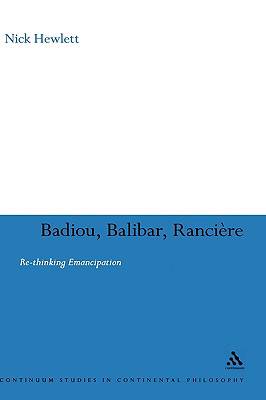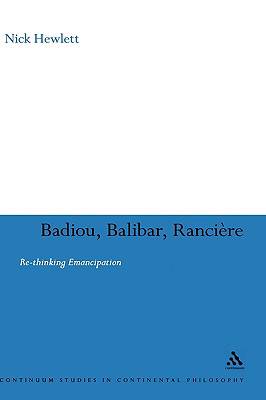
- Afhalen na 1 uur in een winkel met voorraad
- Gratis thuislevering in België vanaf € 30
- Ruim aanbod met 7 miljoen producten
- Afhalen na 1 uur in een winkel met voorraad
- Gratis thuislevering in België vanaf € 30
- Ruim aanbod met 7 miljoen producten
Zoeken
Omschrijving
In recent years there has been increased interest in three contemporary French philosophers, all former students of Louis Althusser and each now an influential thinker in his own right. Alain Badiou is one of the most important living continental thinkers, well-known for his pioneering theory of the Event. Etienne Balibar has forged new approaches to democracy, citizenship and what he describes as 'equaliberty'. Jacques Rancière has crossed boundaries between history, politics and aesthetics and his work is beginning to receive the attention it deserves.
Nick Hewlett brings these three thinkers together, examining the political aspects of their work. He argues that in each of their systems there are useful and insightful elements that make real contributions to the understanding of the modern history of politics and to the understanding of contemporary politics. But he also identifies and explores problems in each of Badiou, Balibar and Rancière's work, arguing that none offers a wholly convincing approach.
Nick Hewlett brings these three thinkers together, examining the political aspects of their work. He argues that in each of their systems there are useful and insightful elements that make real contributions to the understanding of the modern history of politics and to the understanding of contemporary politics. But he also identifies and explores problems in each of Badiou, Balibar and Rancière's work, arguing that none offers a wholly convincing approach.
Specificaties
Betrokkenen
- Auteur(s):
- Uitgeverij:
Inhoud
- Aantal bladzijden:
- 208
- Taal:
- Engels
- Reeks:
- Reeksnummer:
- nr. 62
Eigenschappen
- Productcode (EAN):
- 9780826498618
- Verschijningsdatum:
- 15/12/2007
- Uitvoering:
- Hardcover
- Formaat:
- Genaaid
- Afmetingen:
- 165 mm x 239 mm
- Gewicht:
- 439 g

Alleen bij Standaard Boekhandel
+ 780 punten op je klantenkaart van Standaard Boekhandel
Beoordelingen
We publiceren alleen reviews die voldoen aan de voorwaarden voor reviews. Bekijk onze voorwaarden voor reviews.








